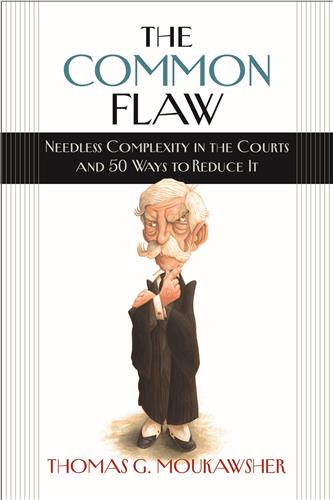In this important book Judge Moukawsher provides an essential roadmap for reconsidering the priorities and aims of the judicial process, placing humanism and the public trust at the center of an important agenda for reform.
The Common Flaw seeks to rid the American lawsuit of needless complexity.
It argues that Americans are losing faith in their courts because after long delays they too often get rid of cases for technical reasons or force them to settle rather than deciding them, and because, when they do decide them, we can’t understand why.
The book proposes fifty changes from the filing of a complaint in court to the drafting of appellate decisions to replace the formalism that prevails in court with a kind of humanism—that decides cases promptly—more on the facts than the law—more for the parties than the lawyers—more for the consequences to the people and the public—and in words we can all understand.


You should come away from his book invigorated by a judge who is not beholden to the “way we have always done it.”
Los Angeles Review of Books
In this important book Judge Moukawsher provides an essential roadmap for reconsidering the priorities and aims of the judicial process, placing humanism and the public trust at the center of an important agenda for reform.
A New England judge with a Southerner's flair for metaphor, he criticized "uselessly perfect teacher evaluations" as part of a rating system, "that is little more than cotton candy in a rainstorm."
Hard to believe that a court ruling could be compelling? Try this: "The state's definition of what it means to have a secondary education is like a sugar cube boat. It dissolves before it's half launched."
I started reading the judge's... decisions and discovered a wonderful trove of language... I could read his decisions forever. Moukawsher wastes no time with fools or foolishness. Upon retiring from the bench, he might try faits divers. Genius.
By explaining the reasoning, history and context behind his ruling in an easy-to-understand language, the judge did the public — the sovereign, if you will — a favor. In that sense, this was an opinion fit for a king.
While you may not agree with every one of the 50 ways Judge Thomas G. Moukawsher proposes to reduce needless complexity, you should come away from his book invigorated by a judge who is not beholden to the “way we have always done it."
Over the course of 51 chapters spanning 240 pages, punctuated by 51 pithy cartoons, Moukawsher soundly nails his 50 theses to the law’s front door calling for reform.
The book is clearly written and argued, and each chapter includes a legal cartoon, which legal reformers are likely to enjoy. There are also plenty of practical tips.
Thomas G. Moukawsher is a Connecticut Superior Court judge, who has spent nearly forty years studying, making, and administering law. He has been a lawyer, a legislator, a lobbyist, and for nearly ten years a complex litigation judge. Judge Moukawsher served in local government and as a member of the Connecticut General Assembly. He also acted as counsel to the Connecticut Democratic Party.
Inside the judiciary, for twenty years, he was one of the country’s leading litigators in pension fraud cases in federal court. He co-chaired the American Bar Association Committee on Employee Benefits and was a co- author and editor of its book, Employee Benefits Law. He is a sustaining life fellow of the American Bar Foundation and a member of the Madison Council at the Library of Congress. He earned a juris doctorate from the University of Connecticut School of Law where he was an editor of the Connecticut Law Review and a degree in English from The Citadel where he edited The Citadel Review.

Founded in 1971, Brandeis University Press is a nonprofit publisher dedicated to publishing innovative, high-quality books for a general audience, as well as scholarship that advances knowledge and promotes dialogue in the humanities, arts, and social sciences around the world.
© Copyright 2024, Brandeis University Press
Brandeis University Press
Goldfarb Library 69-235, MS 046
Brandeis University
415 South Street
Waltham, MA 02453
(781) 736-4547
pressinfo@brandeis.edu

Stay up to date with the newest titles and promotions from Brandeis University Press—while saving 20% on your first purchase.